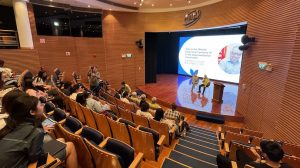A so-called ‘people-centred’ style of business leadership can have a trickle-down effect on employees, says an academic study involving a scholar from IFT. This type of leadership – known as ‘servant leadership’ among academics studying such matters – can lead to positive impacts at different levels in relations between employees, and the people with whom they interact, it is argued.
“Our results demonstrated that servant leadership promotes employees’ discretionary behavior (i.e., performing beyond job description) directed at multiple stakeholders, including leaders, co-workers, and customers,” wrote IFT Assistant Professor Dr. Ali Bavik and research co-authors Ms. Yuen Lam Bavik and Mr. Pok Man Tang. They added that such servant leadership works if employees are allowed to take part in shaping their own roles in the organisation.
The paper, “Servant Leadership, Employee Job Crafting, and Citizenship Behaviours: A Cross-Level Investigation”, was published last year in the Cornell Hospitality Quarterly.
The study results were based on questionnaires answered by 238 respondents. The sample comprised people working in 5-star hotels in Macao, and included employees and their immediate leaders in a total of 38 teams.
Dr. Bavik and his fellow researchers added that servant leaders “empower their followers to maximise their capabilities and to develop their potential to the fullest, thus providing the autonomy employees require for job crafting”. In addition, they stated, servant leadership helps its adherents to work with the employees so that the latter can achieve what the authors termed ‘personal growth’, engage in forward thinking and planning, and find ways to improve job performance. “Servant leaders exert efforts in offering their resources and assistance for employees to master new skills and attain work goals,” the authors said.
In the paper, the researchers argued that servant leadership was “particularly relevant” for motivating individual employees to play an active role in accessing workplace resources in order to gain greater job satisfaction. “Job crafting serves as a means for employees to physically and cognitively alter the psychological experience of their work,” they noted. “Through job crafting, employees may achieve a higher level of work engagement, performance, and psychological well-being.”
Management lessons
Dr. Bavik and his fellow researchers wrote in the paper that the results of their research could be helpful to hospitality executives. “We suggest that organisations can utilise servant leadership and job crafting training to increase employees’ citizenship behaviours,” they wrote, referring to positive actions by individuals directed at co-workers and customers, among other stakeholders.
The authors said hotel managers “could create and/or improve work content and quality as well as ensure that employees have sufficient resources to craft and enhance their work”. In this way, Dr. Bavik and his fellow researchers noted, “employees can potentially increase collaboration with their co-workers and customer-oriented behaviours.”
The team added that managers could even “co-craft” job profiles in partnership with subordinates. “Mutual sharing may increase the potential outcomes of job crafting, and to some extent managers may have some control in the crafting process”, they added.
Job crafting however could under some circumstances lead to negative outcomes, the authors warned. “Managers should consider the nature and/or standardisation level of work and provide clear guidance about organisational ideology, work framework, and work limitations,” they stated.
More info
Ms. Yuen Lam Bavik is a doctoral student in the Department of Management and Marketing of the Hong Kong Polytechnic University. Her research interests cover emotions, social support, resources, and leadership. Her works have been published in the Leadership Quarterly, Cornell Hospitality Quarterly, and International Journal of Hospitality Management.
Mr. Pok Man Tang is a Ph.D. student in the Department of Management and Organization at the National University of Singapore. His research interests include leadership, ethics, emotions, deviance, and humour. His research has been published in internationally renowned journals such as Leadership Quarterly. Prior to his Ph.D. study, he served in managerial and consultancy positions in investment banking, a multi-national retail group, and hybrid organisations.
https://doi.org/10.1177/1938965517719282









